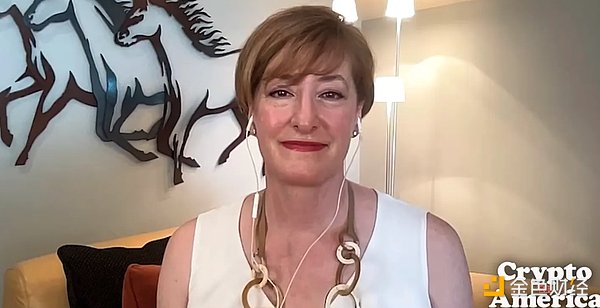Author: Eleanor Terrett; Translator: Shan Ouba, Jinse Finance
The dissenting opinions may pave the way for a Supreme Court review, and the "simplified master account" may be its breakthrough point. This article will explore Custodia Bank's next steps after the Tenth Circuit Court of Appeals upheld the Federal Reserve's ruling on the master account; in addition, it will also summarize key events of interest this week in areas such as market structure, meetings, and elections.

Last Friday, Custodia Bank suffered a new setback in its long-running legal battle with the Federal Reserve over access to its master account.
The Tenth Circuit Court of Appeals upheld a 2024 ruling by the District of Wyoming District Court in a 2-1 vote, granting the Federal Reserve full discretion to deny Custodia Bank access to its master account for use of its payment system. Custodia Bank, headquartered in Wyoming, primarily provides cryptocurrency custody and other digital asset services.
The ruling states: "We believe that the explicit provisions of the relevant regulations grant the Federal Reserve Bank the discretion to refuse a master account access application from a qualified entity; therefore, we reject Custodia Bank's attempt to use legal means to limit the Federal Reserve's 'discretionary power to refuse master account access' in order to safeguard the security of the national financial system."
Previously, the Federal Reserve Bank of Kansas City rejected Custodia's application for a master account in 2023. Had it been granted a master account, the bank could have directly accessed the Fed's payment facilities, held reserves, and completed transaction settlements without relying on a partner bank. Custodia CEO Caitlin Long subsequently filed a lawsuit in the District of Wyoming, but the court upheld the Fed's position, prompting him to appeal to the Tenth Circuit Court of Appeals.
Despite losing the case, Custodia Bank still saw hope in Judge Timothy Tymkovich's dissenting opinion. This opinion was highly consistent with the amicus curiae's opinion submitted by former U.S. Deputy Attorney General Paul Clement in the case, both arguing that the Federal Reserve's appointment process was unconstitutional and that its power in approving master accounts was unchecked.
In his objection, Tymkovich wrote: “I do not believe the entire Federal Reserve system is unconstitutional… but if the Fed’s independence is constitutional solely because of ‘following the unique historical traditions of the First and Second Banks of the United States,’ then the Fed should wisely avoid expanding its power beyond those historical boundaries. The Kansas City Federal Reserve Bank’s refusal to provide Custodia with a master account effectively and illegally deprived it of its right to access essential services for its business, and this should not be permitted.”
Following the ruling by the Tenth Circuit Court of Appeals last Friday, Custodia Bank issued a statement on its X platform, specifically highlighting the objection: "While we had hoped for a victory in the Tenth Circuit, we received a suboptimal outcome—a strongly worded objection. It raises serious questions about the constitutionality of the Federal Reserve..."
According to lawyers familiar with the case, this objection, coupled with the support of prominent Supreme Court lawyers such as Paul Clement, may be enough to prompt the U.S. Supreme Court to consider hearing the case and examine whether the Federal Reserve's structure and discretionary power in approving the master account are constitutional.
However, Custodia Bank has more immediate options before seeking Supreme Court intervention. The company stated that it is actively considering a retrial by a panel of judges, requesting the same panel to review the decision. Alternatively, Custodia could apply for a full court retrial—hearing the case by all serving judges of the Tenth Circuit Court of Appeals, rather than just the initial three judges. Full court retrials are typically reserved for cases that "may establish significant precedent" or whose "panel decision is particularly significant."
Custodia could also choose to settle with the Federal Reserve and withdraw its lawsuit, but the bank will likely insist on obtaining the master account. This outcome is now more likely than ever thanks to a new initiative by the Federal Reserve—which may soon allow institutions providing payment services to apply for a special type of master account.
Last month, Federal Reserve Governor Christopher Waller announced this so-called “simplified master account,” a simplified version of the full master account, designed to allow legally qualified cryptocurrency and fintech companies to access the central bank’s payment system while controlling systemic risk.
In an interview with Crypto In America, Waller said, "We may consider agencies like Custodia and Kraken... The approval process will become simpler and faster, instead of taking six years and going to court like in the past."
If Custodia obtains the master account through a settlement, the Wyoming bank will become the first cryptocurrency-related institution to receive this qualification, giving it a first-mover advantage. This will set it apart from other cryptocurrency companies that may qualify for the Federal Reserve's "slim master account" application guidelines. Waller stated that the guidelines are still in their early stages and could take up to a year to be finalized.
The infrastructure of the future financial system is being built on the Avalanche blockchain, with institutions such as Citibank, JPMorgan Chase, BlackRock, and Dinari serving as witnesses.
Key Focus This Week
Government shutdown
If the US government shutdown continues beyond Wednesday, it will surpass the 35-day shutdown record set by the Trump administration in 2018, becoming the longest government shutdown in US history. Previously, a federal judge ordered the government to use emergency funds to temporarily secure funding for the Supplemental Nutrition Assistance Program (SNAP), thus temporarily suspending the benefits for approximately 4.2 million Americans who rely on this program. Last week, Trump urged the Senate to bypass the lengthy debate process and pass a government funding bill without Democratic support, but Senate Majority Leader John Thune (Republican, South Dakota) stated he would insist on the process. Congress will continue voting this week, with Senate Democrats seemingly determined to "prevent the government from reopening until Republicans agree to extend Obamacare subsidies (covering over 20 million Americans)," while Republicans remain firm in their position. The House of Representatives remains in recess.
Market Structure
A new week means potential new developments in market structure-related legislation. Last week we reported that the Senate Agriculture Committee was close to releasing a bipartisan draft bill, and this remains unchanged. We will be closely monitoring whether the committee releases the text of the bill—reportedly, Committee Chairman John Boozman (Republican, Arkansas) and Cory Booker (Democrat, New Jersey) have reached an agreement and are currently finalizing some terms. Meanwhile, we will also be focusing on developments on the Senate Banking Committee, where bipartisan negotiations have resumed. All indications suggest that both chambers hope to complete the draft bill review process before senators take the Thanksgiving break. However, the Senate will adjourn next week for Veterans Day, leaving senators with only the week of November 17th to work on the bill—provided the government has already restarted operations by then.
Cryptocurrency Conference
New York will be the focus of the global cryptocurrency world this week.
Ripple's flagship conference, Swell, will be held Tuesday through Wednesday at Hudson Yards, bringing together figures from cryptocurrency, traditional finance, and Washington politics. Keynote speakers include Nasdaq CEO Adena Friedman, Ripple CEO Brad Garlinghouse, White House Cryptocurrency Commission Executive Director Patrick Witt, and Representative Ritchie Torres (Democrat, New York).
The ChainLink SmartCon conference, held at the Chelsea Metropolitan Exhibition Centre, not far south of the Swell venue, will run until Wednesday. Executives from SWIFT, JPMorgan Chase, Mastercard, Aave, Consensys, and other organizations will be in attendance, with key topics including on-chain events, compliance, identity authentication, and emerging use cases.








